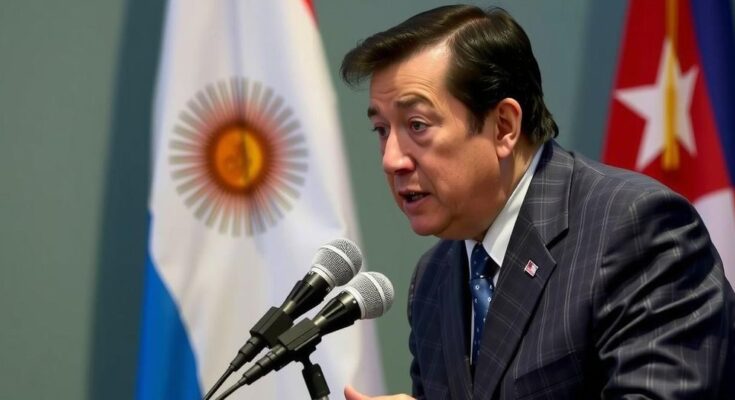President Javier Milei of Argentina has terminated Foreign Minister Diana Mondino after the country voted in favor of lifting the U.S. embargo on Cuba at the United Nations. This shift signifies a departure from previous foreign policy under the Peronist government, as Argentina aligns itself closely with U.S. interests, categorically opposing the Cuban government.
President Javier Milei of Argentina has dismissed Foreign Minister Diana Mondino following the country’s recent decision to support a United Nations resolution aimed at lifting the United States economic embargo on Cuba. Argentina’s endorsement of the non-binding measure came amidst a backdrop of diplomatic tension, marking a notable departure from the alignments established under previous administrations. The vote saw 187 nations in favor, with only the United States and Israel opposing. This action is significant as it represents the first instance in which Argentina has not conformed to the positions of the U.S. and Israel since Milei took office. Upon Mondino’s dismissal, the President appointed Gerardo Werthein, the current ambassador to Washington, as her successor. The Milei administration subsequently issued a statement reaffirming its stance against what they termed a “Cuban dictatorship.” Under the preceding leftist Peronist government, Argentina fostered a supportive relationship with Cuba, advocating the cessation of the longstanding embargo established in the 1960s in reaction to Cuba’s shift towards communism under Fidel Castro. Previous collaborations included Cuba’s backing of Argentina’s sovereignty claims over the Falkland Islands, a territory administered by Britain. In light of these developments, Milei’s administration articulated a new foreign policy framework, emphasizing values such as freedom, sovereignty, and human rights, characteristic of Western democratic ideals. The assertion of a categorical opposition to regimes violating human rights suggests a more rigidly aligned international posture under the current administration compared to its predecessor. Observers have noted growing friction between Milei and the foreign ministry over various issues, although Mondino was regarded as crucial to maintaining Argentina’s diplomatic image, often mitigating tensions resulting from Milei’s provocative statements. The U.S. trade embargo has its origins in 1962, aimed largely at forcing a renunciation of Castro’s socialism in favor of capitalist democracy. Despite its duration, many critics argue that the embargo has failed to achieve its initial objectives and continues to be a contentious issue between Washington and neighboring countries.
The United States imposed its economic embargo on Cuba in 1962 following the Cuban Revolution, which saw Fidel Castro establish a communist regime. The embargo was intended as a means of coercion to compel Cuba to abandon its socialist policies. Over the decades, the embargo has faced extensive criticism for its impact on the Cuban populace and its ineffectiveness in instigating political change. Furthermore, Latin American countries, including Argentina, have historically fluctuated in their support for Cuba, heavily influenced by their own political climates and relationships with the U.S. The recent actions taken by President Milei indicate a significant shift in foreign policy, reflecting an alignment with U.S. interests contrary to the previous administration’s stance.
In summary, President Javier Milei’s dismissal of Foreign Minister Diana Mondino following Argentina’s vote to endorse the lifting of the U.S. embargo on Cuba exemplifies a pronounced shift in the country’s foreign policy direction. With a newfound commitment to align with U.S. values and opposition to regimes perceived to violate human rights, Milei’s administration seeks to redefine Argentina’s role on the global stage, distancing itself from prior associations and policies cultivated under left-leaning governance.
Original Source: www.bbc.com




